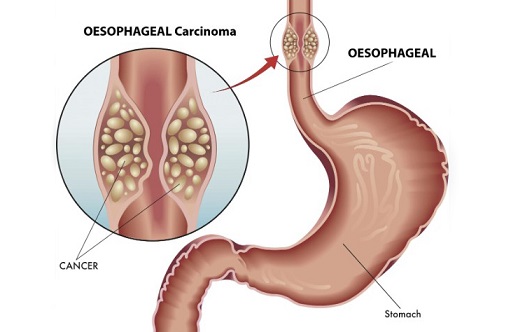Thailand Medical Study Finds Combined Chemotherapy and Radiation Boost Survival in Advanced Esophageal Cancer
Nikhil Prasad Fact checked by:Thailand Medical News Team Oct 30, 2024 5 months, 2 weeks, 1 day, 2 hours, 18 minutes ago
Thailand Medical: In the ongoing fight against esophageal cancer, recent research from Thailand sheds new light on advanced treatment options for esophageal squamous cell carcinoma (ESCC). The study, conducted by researchers from the Faculty of Medicine at Prince of Songkla University-Thailand, suggests that combining chemotherapy with radiation, known as concurrent chemoradiotherapy (CCRT), significantly improves survival for patients battling this severe form of cancer. This Thailand-based investigation highlights potential benefits for ESCC patients, especially those without distant metastasis.

Thailand Medical Study Finds Combined Chemotherapy and Radiation Boost Survival in Advanced Esophageal Cancer
The Rising Concern of Esophageal Cancer in Thailand
Esophageal cancer continues to be a significant health concern globally, with Thailand witnessing rising cases each year. In 2020 alone, over 604,100 new cases were reported worldwide, and esophageal cancer ranked as the sixth leading cause of cancer deaths. Unfortunately, late diagnosis often limits treatment options, and the survival rate remains low. Patients diagnosed with advanced ESCC face additional challenges as their condition usually precludes surgical intervention, leaving chemotherapy as a primary palliative care option. This
Thailand Medical News report covers a new study comparing CCRT against chemotherapy alone, aiming to determine which approach offers more hope for advanced ESCC patients.
Study Overview: Comparing CCRT and Chemotherapy in ESCC
This pioneering study by Jirapat Wonglhow, Panu Wetwittayakhlang, Patrapim Sunpaweravong, Chirawadee Sathitruangsak, and Arunee Dechaphunkul enrolled 196 patients from Songklanagarind Hospital at Prince of Songkla University, aiming to establish which treatment offers the best survival outcomes. The patients, all diagnosed with advanced-stage ESCC, received either chemotherapy alone or a combination of chemotherapy and radiation.
In terms of efficacy, the researchers found that patients undergoing CCRT survived an average of 9.04 months, compared to 5.79 months for those receiving only chemotherapy. For ESCC patients without distant metastasis (classified as stage IVA), CCRT extended survival to an average of 11.21 months - double that of chemotherapy alone. Meanwhile, the progression-free survival (PFS), the period a patient lives without the disease worsening, also improved significantly with CCRT, lasting 6.04 months compared to 3.50 months for chemotherapy alone.
Detailed Findings: Survival Rates and Tumor Response
The study further analyzed the objective response rate (ORR), a measure of how well the tumor responds to treatment. Patients undergoing CCRT achieved a 43.6% ORR, while those on chemotherapy alone saw a significantly lower rate of 22.8%. This increased tumor response rate highlights CCRT's potential to better manage symptoms and possibly enhance patients’ quality of life.
However, CCRT wasn’t without its risks. The combination of chemotherapy and radiation increased certain side effects, particularly hematologic issues like neutro
penia (a dangerous reduction in white blood cells), leukopenia, and febrile neutropenia. Additionally, 18% of patients in the CCRT group experienced mild radiation-associated pneumonitis, an inflammation of lung tissue.
The Impact of CCRT on Distant Metastatic Disease
While the overall benefits of CCRT were clear, researchers noted its limited efficacy for stage IVB ESCC patients with distant metastasis. For these patients, CCRT extended survival times but without statistically significant improvement over chemotherapy alone. Thus, CCRT seems best suited for patients with advanced ESCC but without spread to distant organs, as it allows for more localized treatment without excessive toxicity.
Analyzing Patient Characteristics and Treatment Outcomes
The study observed that certain baseline patient characteristics- like better overall health, fewer distant metastases, and no liver or lung involvement - contributed to longer survival times. This highlights the importance of patient selection when considering CCRT, as patients with good health and localized tumors may experience the most benefit. This selective approach ensures treatment efficacy while managing risks, allowing patients to make informed decisions with their healthcare providers.
Conclusion
The findings from this research are promising for the advanced treatment of ESCC, with CCRT showing clear survival benefits for stage IVA patients. By combining chemotherapy and radiation, the approach tackles both local tumor growth and systemic cancer spread, providing an extended survival window for patients who meet the appropriate criteria. However, with greater toxicity risks, the study emphasizes that careful patient selection remains essential.
For patients battling this aggressive cancer, this study provides hope that CCRT can offer an effective alternative to chemotherapy alone, potentially transforming the outlook for advanced ESCC care in Thailand and beyond.
The study findings were published in the peer-reviewed Journal of Clinical Medicine.
https://www.mdpi.com/2077-0383/13/21/6353
For the latest Medical Research News, keep on logging to
Thailand Medical News.
Read Also:
https://www.thailandmedical.news/news/thailand-medical-study-unveils-betaine-s-anti-cancer-potential-in-oral-cancer
https://www.thailandmedical.news/news/thailand-medical-study-shows-mung-bean-protein-improves-cardiovascular-health-in-middle-aged-adults
